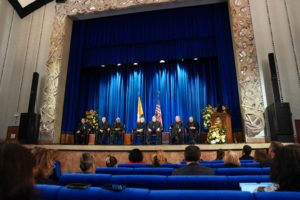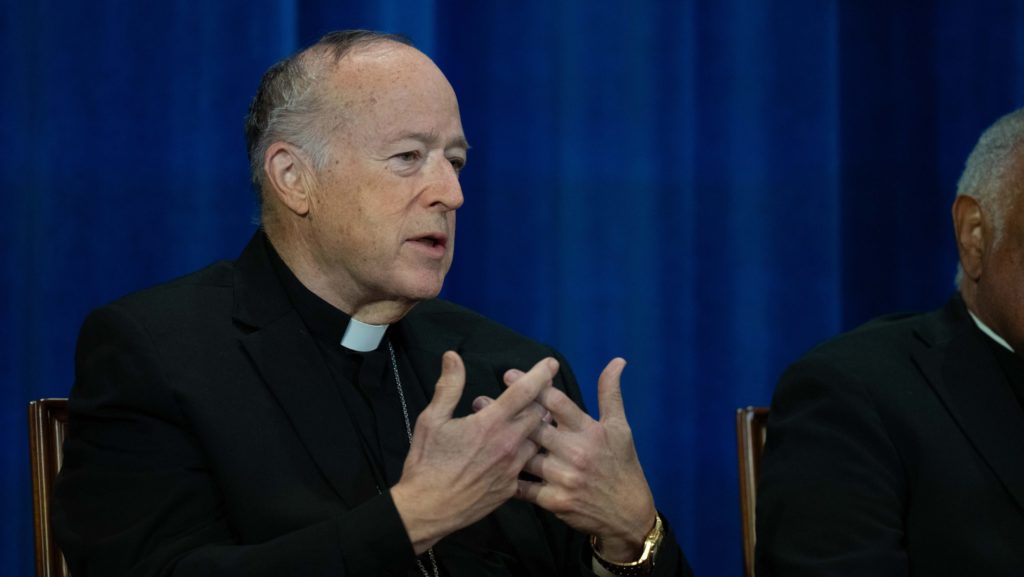Cardinal Robert McElroy of Washington, D.C., expected before the conclave that then-Cardinal Robert Prevost’s being an American “would be a major obstacle” to his election to the papacy, he told Angelus.
“I had thought before entering the conclave that it would be a tough hill for [Prevost] to climb or any other candidate who’s American, but it was not,” said McElroy, the only California native in the conclave that elected Pope Leo XIV in four ballots on May 8.
“America has great economic culture, political power, and military power, and [for an American] to be heading the Church too, seemed to me not likely.”
McElroy made the comments in an interview with Angelus following a May 9 press conference with fellow U.S. cardinal-electors at the North American College in Rome, where McElroy had told journalists that the “the impact of Leo’s being American was almost negligible in the deliberations of the conclave.”
“What surprised me was the real absence of that being a key question in this conclave,” said McElroy in response to a question about whether the Trump administration’s tense relationship with the U.S. affected the conclave’s choice.
“It certainly wasn’t an obstacle, wasn’t a focus of discussion at all,” said McElroy, who has spent most of his life living and ministering in California, including as bishop of San Diego from 2015 until earlier this year, when Pope Francis appointed him archbishop of Washington, D.C.
Instead, according to McElroy, the cardinals paid more attention to Prevost’s “personal qualities” and his experiences as a missionary in Latin America, mainly Peru, and being the prior general of a major international religious order, the Augustinians.
“In a sense, we’re there not as citizens of any country, we’re there as members and leaders of the Church, in which all of us are one in our humanity,” McElroy told Angelus.

McElroy’s comments expressed the shared opinion among cardinals at the press conference like Timothy Dolan of New York and Daniel DiNardo, retired archbishop of Galveston-Houston, that’s Prevost’s years away from home as a missionary made him a “citizen of the entire world.”
“[Pope Leo XIV] reminds us that we all have our citizenship in heaven, as St. Paul taught us,” said Cardinal Dolan. “Where he comes from is certainly now a thing of the past. You know, Robert Francis Prevost is no longer around. It’s now Pope Leo. That’s why Jesus changed the name of the first pope, right? You’re no longer Simon, your name is Peter. So he’s a new person.”
While bound to an oath of secrecy surrounding the conclave’s inner workings, other American cardinal-electors offered clues at the press conference to how the conclave reached its decision.
Cardinal Blase Cupich of Chicago credited the atmosphere of listening and respect at the cardinals’ daily pre-conclave meetings at the Vatican with setting the stage for a quick conclave.
“When it came time to vote, things seemed to just gel and go in a direction that set us on a path to unity,” said Cupich. “If only the rest of us in our lives and in our world could have that mad dash to unity that we seemed to have in the conclave.”
Cardinal Joseph Tobin, who has known Pope Leo for decades, recalled how after stepping forward to cast his ballot in the Sistine Chapel, he turned to see Prevost with his head in his hands.
“I was praying for him, because I couldn’t imagine what happens when a human being faces something like that,” said Tobin. “And then, when he accepted it, it was like he was made for it.”
"All of the anguish or whatever was resolved by feeling, I think, that this wasn't simply his saying yes to a proposal, but that God had made something clear, and he agreed with that."

